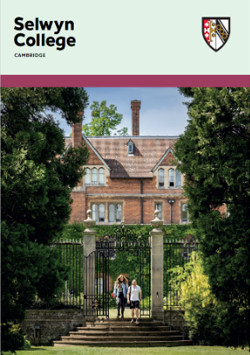The subject at Selwyn
Selwyn has a record of success in all the subjects within the AMES course and provides strong support for students, and the fact that Selwyn is known to encourage smaller subjects is also an advantage.
We welcome applications for all parts of the AMES course. Applicants wishing to continue a modern European language with Arabic, Persian or Hebrew should apply for AMES.
The College Library holds over 40,000 books, including those most relevant to this subject, and stock is continually updated. The Library also provides a pleasant study area.
Teaching Fellows at Selwyn
Our Director of Studies for the AMES course is Dr Victoria Young, who is the Kawashima Lecturer in Japanese Literature and Culture. Here she explains the role of director of studies:
Qualities we are looking for
AMES offers interdisciplinary degree courses that are equally stimulating and challenging. At their heart, AMES subjects teach difficult, non-European languages whose grammars can be quite different from languages such as French and German. A strong interest in language and culture, and an aptitude for language-learning is therefore very important. Students with an aptitude for Mathematics and Sciences have also excelled through their ability to understand and recognise patterns. AMES subjects also comprise the in-depth study of humanities-based subjects including history, literature, sociology, and politics. These subjects demand skills in close, critical reading and good essay writing. In the final year, students also produce a research dissertation on a topic of their own choosing. An independent approach to learning will therefore be expected, and enthusiasm is essential.
Subject requirements
AMES language courses are taught ab initio (from scratch). This means that although some prior knowledge can, of course, be very useful, it is not necessary for success. Please note that, as stated clearly on the Faculty website, our courses are not suitable for native speakers.
There are no specific subject requirements for these languages, and students have excelled having studied a range of academic subjects. However, applicants are encouraged where possible to study a foreign language at school to demonstrate their interest in, and experience of, language-learning. Applicants who are studying a foreign language at school should aim to achieve top grades in those subjects: it is desirable to be on track to achieve A* at A-Level or equivalent in your language. Students might also demonstrate their interest by reading around the subject for which they are seeking to apply.
If you are planning to combine Arabic, Persian or Hebrew with a language taught in the MMLL faculty (French, German, Italian, Portuguese, Russian, Spanish), you will need an A-Level, IB Higher Level, or equivalent qualification in the European language. At Selwyn, we tend to make conditional offers in the range A*AA - A*A*A; comparable conditions are set for those taking the IB and other school-leaving examinations.
Written work
Candidates who apply for a European language will be asked to submit one piece of written work in the language they are currently studying.
Interviews
Candidates for AMES will usually sit two interviews: one subject-based and one general. The subject interview will be conducted by the College's Director of Studies in AMES and a specialist in the candidate's chosen language, and will focus on issues within the field of East Asian and/or Middle Eastern Studies. The general interview will probe further as to a candidate's motivation and general aptitude for their chosen course. Candidates who have applied to study a Middle Eastern Language with a European language will also sit a third interview with specialists in their chosen European language.
Admissions assessment
If you are invited for interview and are applying for a European language, you will also be asked to take a written assessment for MML. You do not need to register for this written assessment as it will be organised automatically by the College if you are invited for interview.
Students who are not applying for a European language do not take this assessment.
April 2025


